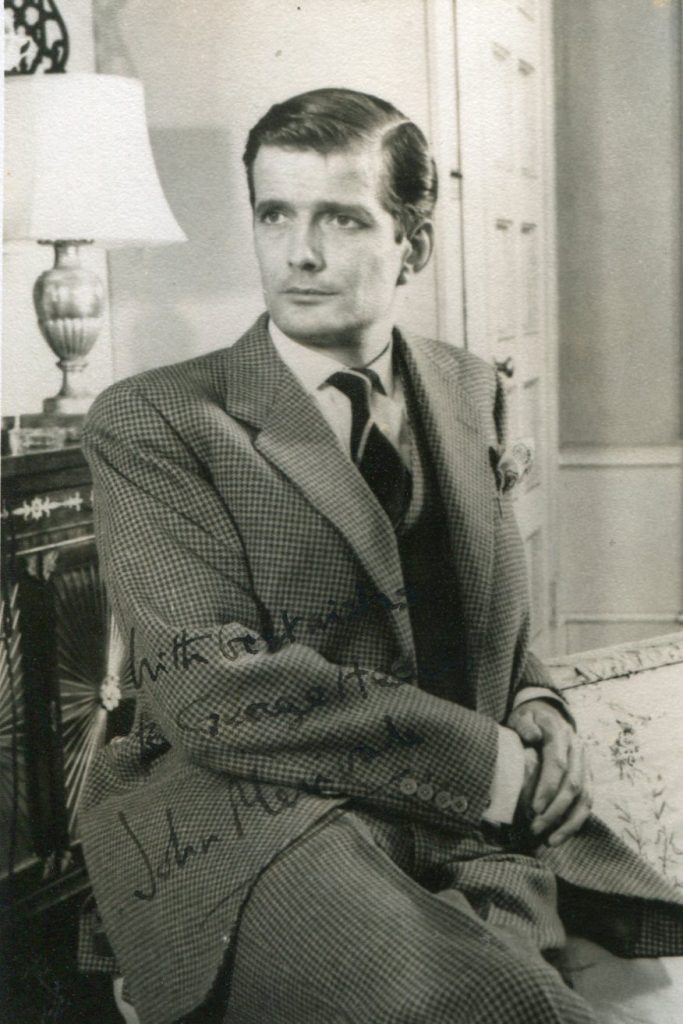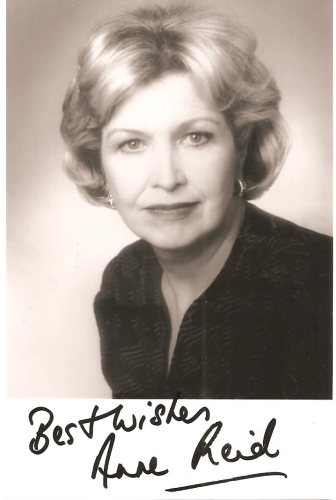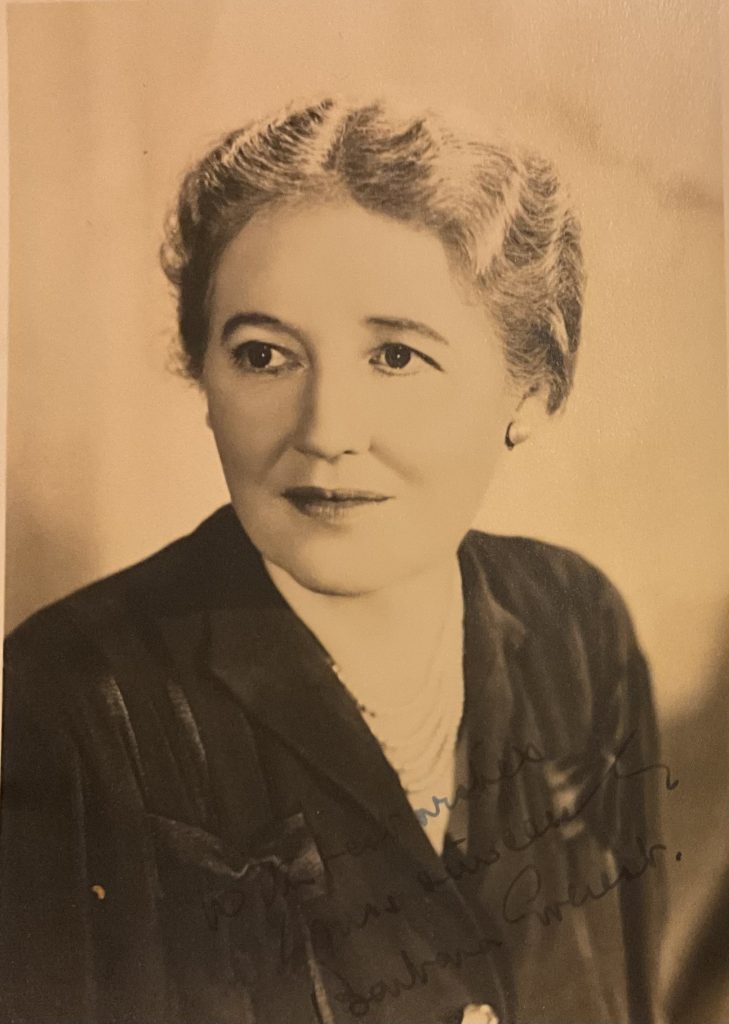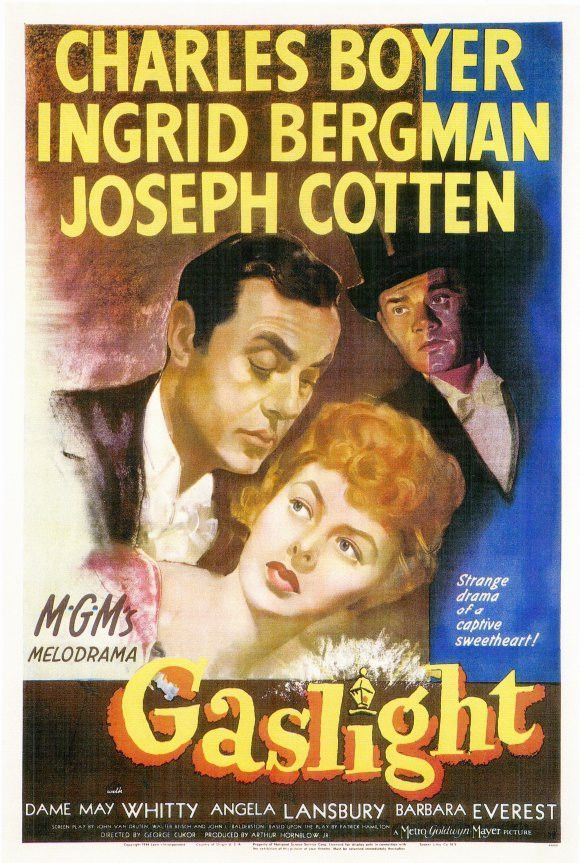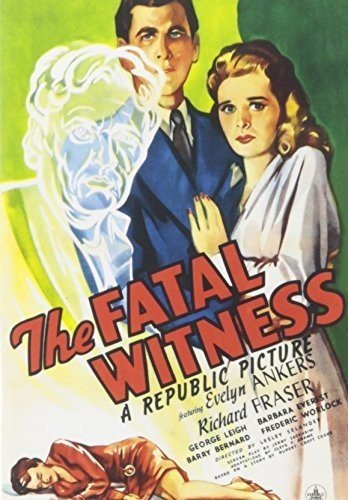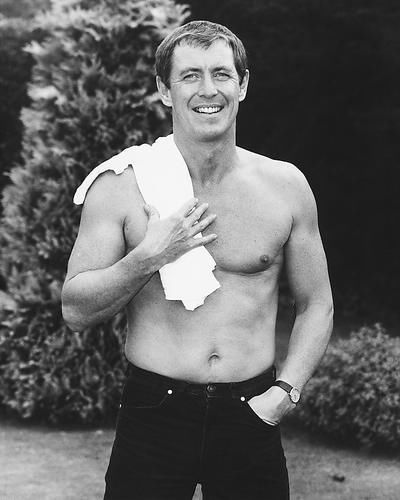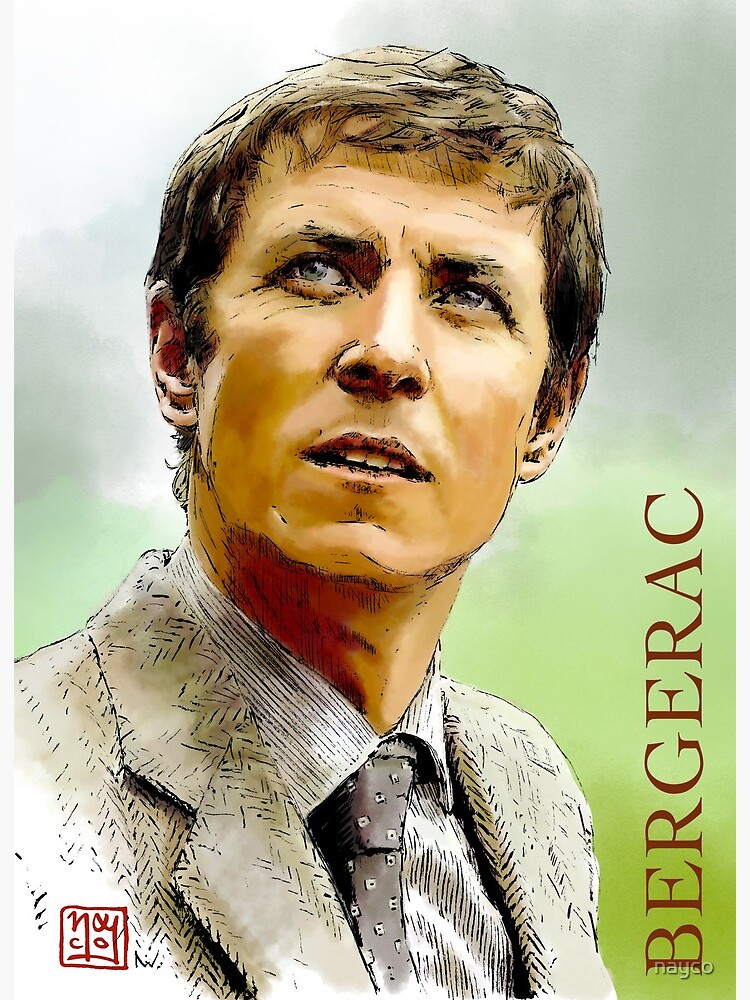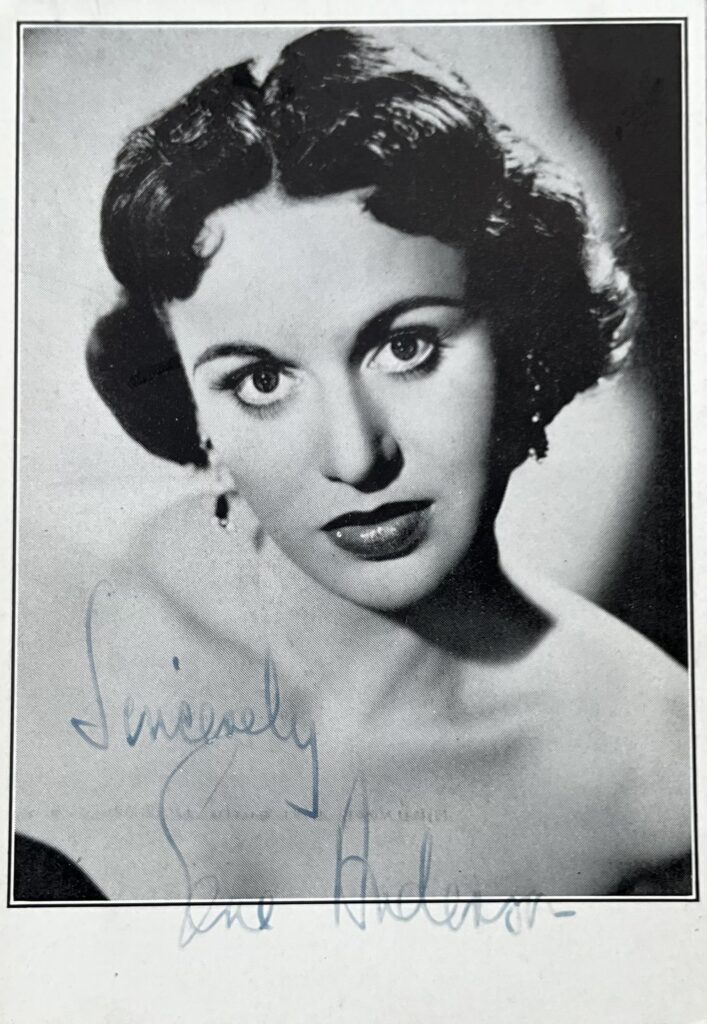Donald Sinden was born in 1923 in Plymouth, Devon. He made his first stage appearance in Brighton in 1941. He began his film career in “Portrait from Life” in 1948. His other films include “Mogambo” opposite Grace Kelly 1953, “The Cruel Sea”, “Mad Aboiut Men” with Glynis Johns and in 1959, “The Captain#s Table” with Peggy Cummins. He was still acting in his med-eighties on television in “Judge John Deed”. “Midsomer Murders” and “Marple”. He died in 2014.
The son of a country chemist, the British actor Donald Sinden intended to pursue a career in architecture but was spotted in an amateur theatrical production and asked to join a company that entertained the troops during World War II (Sinden was rejected for naval service because of asthma). Following a brief training at drama school, he established himself in theater, particularly as a Shakespearean actor. Having made his film debut in The Cruel Sea (1953), Sinden became a leading man in British films during the 1950s and then moved onto character roles later in his career. While his film appearances became less frequent, he worked steadily in theater (with the Royal Shakespeare Company, primarily) and in television, notably as the unperturbable butler in “Two’s Company” (1975) and as a miserable in-law in “Never the Twain” (1981).
“To hear him in full spate is not unlike being shot between the eyes by the world’s largest plum,” said the journalist John Preston of Donald Sinden, who has died aged 90. The remark was applicable to the actor’s vocal delivery both on stage and off. No review was ever penned without “fruity” appearing somewhere near “voice” in the text. Judi Dench, who played a notable Beatrice to his Benedick in Much Ado About Nothing in 1976, said he had “a Christmas pudding of a voice, soaked in brandy”; while the director Peter Hall, who played a very big part in his career, likened it to a bassoon that could be terribly tragic, terribly moving – and extremely funny. Physically, too, Sinden was both imposing and endlessly, sometimes outrageously, inventive. In all, Michael Billington averred, he was a critic’s dream, because he always gave you so much to write about.
He became nationally renowned as a Rank contract artist in the 1950s, appearing in notable films such as The Cruel Sea (1953) with Jack Hawkins, Mogambo (1953), directed by John Ford, with Clark Gable and Ava Gardner, and Doctor in the House (1954) and Doctor at Large (1957), with Dirk Bogarde and James Robertson Justice, and from the 1960s in TV sitcoms. Nonetheless, Sinden was unashamedly theatrical. He rarely went on stage without an item of historical significance: a pair of Henry Irving’s boots, Fred Terry’s eye-glass or John Martin Harvey‘s hat. He lived and breathed the traditions of his trade, and bent the technique he sought out from his elders – he learned about listening and timing, for instance, from Baliol Holloway – to the service of both tragic and comic gods.
He was a notable Shakespearean at Stratford-upon-Avon either side of his early film stint, playing a booming, militaristic King Lear (“Let me not stay a jot for dinner … dinner, ho, dinner!” has never sounded so heartfelt) in the same season as Benedick and, soon after, less successfully, a blacked-up Othello. He characteristically said that Lear became nice and easy after three acts, whereas Othello started quietly and just got harder and harder. Like one of his heroes, David Garrick, he believed that tragedy was easier than comedy: “The expertise you need for farce,” he said, “is far greater than for Shakespeare, though with him there has to be greater intellectual awareness.”
Sinden on the back foot, exposed and flummoxed in comedy, was one of the sights of the age; his great jowls would sag in a mask of stricken gravity, his eyes fixed wide open, and he would rake the stalls with baleful stares, reducing his audience to a state of gleeful hysteria.
The second of three children, he was born in Plymouth, the son of Alfred, a chemist, and Mabel (nee Fuller), and grew up in Ditchling, East Sussex. He suffered from asthma from an early age and attended a series of private schools before going to Hassocks primary. He failed the 11-plus, went on to Burgess Hill secondary and, at the age of 15, was apprenticed in carpentry and attended evening classes in draughting, with aspirations to become an architect and surveyor.His workplace was in nearby Brighton, where he fell into amateur dramatics and was given a chance by the director of the Theatre Royal, Charles F Smith, who invited him to join his Mobile Entertainments Southern Area company, with his first professional appearance coming in 1942. His asthma kept him out of wartime action, and he continued with MESA and in joinery. Smith, who had seen Irving act, introduced him to the leaders of his new profession – John Martin Harvey, Irene Vanbrugh, Marie Tempest – and the critic James Agate.
In the 1944 volume of his diaries published as The Selective Ego, Agate records how he muttered, “Stick to your fretwork, young man,” before asking “Don Sinden” to recite Wolsey’s farewell from Henry VIII and finding evidence of promise: “Enough height, an attractive head, something of the look of young [Henry] Ainley, a good resonant voice, vowels not common, manner modest yet firm.” Later that year, after four years of modern comedies and one-night stands for the forces, Sinden embarked on two terms of training at the Webber Douglas School, before making his regional debut at the Leicester Rep, moving on to the Stratford-upon-Avon Memorial theatre in 1946 for two seasons; his roles included Dumaine in Love’s Labour’s Lost, Lorenzo in The Merchant of Venice and Paris (also understudying Romeo) in Peter Brook’s Romeo and Juliet.
His contract with Rank followed seasons at the Old Vic in both London and Bristol. By 1960 Sinden was anxious to resume his place on the stage. He was an ideal Captain Hook (doubled with Mr Darling) in Peter Pan opposite Julia Lockwood at the old Scala, but Hall, he said, “rescued” him at the RSC, where he played Mr Price in Henry Livings’s surreal comedy Eh? and the Duke of York in the legendary Wars of the Roses history play cycle at Stratford and the Aldwych in London for two years, and shown on BBC television in 1965.
In the latter, Peggy Ashcroft as the “she-wolf” Queen Margaret wiped his face with a rag soaked in the blood of his murdered son, and their brutish stand-off, ending in York’s torture and death, was a highlight of the cycle. Still he maintained a wider public profile in the popular television comedy series Our Man at St Mark’s (1964-66), where he succeeded Leslie Phillips as a country vicar kept in check by Joan Hickson’s sarcastically overbearing housekeeper.
He consolidated his RSC status, and was made an associate of the company, with his Lord Foppington in Vanbrugh’s The Relapse, a feast of frippery and (“Stap me vitals”) asides. Sinden based his makeup on that of Danny La Rue, but went even further with the rouge, the ribbons, the giant poodle wig and the flutter of silk kerchiefs.
He was in full sail, and added three more great performances in the 1969-70 season: a comically puritanical, granite-featured Malvolio (his model was the Graham Sutherland portrait of Somerset Maugham) opposite Dench’s exquisite Viola in Twelfth Night; a four-square Henry VIII based on Holbein; and another knockout fop, Sir William Harcourt Courtly, in Boucicault’s London Assurance, directed by Ronald Eyre.
In between, he somehow threaded long West End runs in two hit farces: Terence Frisby’s There’s a Girl in My Soup (1966), in which he executed a celebrated piece of “business”, breaking two eggs (he played a celebrity chef) while seducing Jill Melford’s “dolly bird”; and Ray Cooney and John Chapman’s Not Now, Darling (1968), weaving a web of deceit and adultery in a fantastic double act with another great farceur, Bernard Cribbins.
Still refusing to erect barriers between the subsidised and commercial stages – at a time when others were busy doing so – he played in Terence Rattigan’s In Praise of Love (originally After Lydia) opposite Joan Greenwood at the Duchess theatre in 1973 and in Ibsen’s An Enemy of the People (“The strongest man in the world is he who stands alone”) at Chichester in 1975.
His last hurrah at the RSC was that wonderful Much Ado (directed, as was their Twelfth Night, by John Barton), he and Dench dicing with love and the onset of middle age in the last-chance saloon of a colonial Indian sunset. Sinden’s technique of embracing the audience in his confidence while building a complex character was breathtaking. His Benedick, the best I have seen, was hilarious and heart-breaking, vain, masculine, silly and romantically efflorescent.
He segued into his second big television series, Two’s Company (1975-79), playing a Jeevesian butler to Elaine Stritch‘s acerbic, best-selling American author who had moved to London. Bill McIlwraith’s scripts capitalised on both actors’ gifts for laconic comedy, rife with misunderstanding and affronted dignity; the result was high-calibre warfare between two proud thoroughbreds.
Another compelling sitcom partnership, full of barely concealed or absolutely open outrage, came with Windsor Davies in Never the Twain (1981-91). The rivalry between the two antique dealers was in no way assuaged by the love and marriage of their respective offspring.
His West End appearances in the 80s included an overage matinee idol in Noël Coward’s Present Laughter, an overage Uncle Vanya at the Haymarket (one role, perhaps, that proved beyond his considerable range) and Sir Peter Teazle in A School for Scandal. But he struck gold twice in this decade: first, as Dick Willey MP, a lascivious Home Office minister, in Ray Cooney’s Two Into One (1984) at the Shaftesbury, raking the house with his trademark battery of stricken oiellades when caught with his trousers, as it were, down; then as Sir Percy Blakeney in Nicholas Hytner’s sumptuous 1985 revival of The Scarlet Pimpernel, which transferred from Chichester to the Haymarket.
These monstrous star performances, the one a fond farewell to the old Aldwych farce traditions (aided and abetted by the brilliant Michael Williams, the RSC Fool to his Lear), the other an extravagant adieu to the Victorian stage, still revealed Sinden at the peak of his powers.
In the 90s, he played an outdated view of Oscar Wilde as a martyred music-hall act in Diversions and Delights, a retread of Dick Willey in Cooney’s less delirious sequel Out of Order, and a somewhat tackily lecherous old Duke of Altair (one of Laurence Olivier’s most dashing, moonstruck roles) in Christopher Fry’s Venus Observed at Chichester.
He fared better with Hall, yet again, as a definitive, baffled Mr Hardcastle, the country squire who is mistaken for an innkeeper in She Stoops to Conquer (“I no longer know me own house!”) and as a growling, highly political Polonius to Stephen Dillane’s taciturn Hamlet, the inaugural production at the newly named Gielgud theatre (formerly the Globe). His last West End appearance came in Ronald Harwood’s Quartet at the Albery (now the Noël Coward) in 1999, playing an operatic has-been in an old folk’s home, stalking the stage with Ralph Richardson’s walking stick.
In later years, he toured abroad, indefatigably and heroically, in both the RSC’s The Hollow Crown, John Barton’s entertainment about English monarchs, and his own compilation of poetry and reminiscences. He served on many committees, notably the Arts Council and the Theatre Museum, and was a highly visible and participatory member of the Garrick Club. His television work continued, notably as the father of the ex-wife of Judge John Deed (2001-07): of his own full-of-himself character he said, “He cannot understand why the series is not called Judge Joseph Channing.”
Sinden was made CBE in 1979, but his “old actor laddie” public persona, exuding an air of fulsome ingratiation, made him a sitting target for Spitting Image, the television satire show, where his florid, fawning puppet yearned for further recognition. The knighthood duly arrived in 1997.
His appetite for absorbing, and preferably relating, theatrical anecdotes was unquenchable, and he produced two delightful volumes of autobiography, A Touch of the Memoirs (1982) – which contains a lovely account of a Sussex childhood – and Laughter in the Second Act (1985), an invaluable, idiosyncratic document in the history of the RSC and the West End. He was a great lover of architecture, the countryside and its churches, producing The English Country Church (1988) alongside two other collections, The Everyman Book of Theatrical Anecdotes (1987) and The Last Word (1994), featuring put-downs, final utterances and epitaphs.
Sinden married the actor Diana Mahony in 1948 and they were inseparable until her death in 2004. Their first son, the actor Jeremy, died in 1996. He is survived by their second son, Marc, also an actor, as well as a director and producer, and by his brother Leon, another actor.
• Donald Alfred Sinden, actor, born 9 October 1923; died 11 September 2014
The above “Guardian” obituary can also be access online here.















